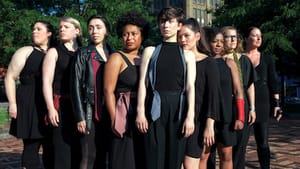Stay in the Loop
BSR publishes on a weekly schedule, with an email newsletter every Wednesday and Thursday morning. There’s no paywall, and subscribing is always free.
A Shakespeare oasis
Philly Fringe 2018: Revolution Shakespeare presents 'Troilus and Cressida'

The fifth installment of Revolution Shakespeare’s Fringe Festival outdoor productions in Hawthorne Park, Troilus and Cressida again uses the cozy neighborhood space imaginatively on a small budget. Director Brenna Geffers’s ensemble of 11 women makes the play accessible and exciting.
Revolution Shakespeare, led by founder Griffin Stanton-Ameisen, bravely produces lesser-known, seldom-seen Shakespeare plays. After its first show, 2014’s Macbeth, it's shared Love’s Labour’s Lost, King John, and Cymbeline.
The company also holds readings and other events. Troilus and Cressida’s all-female casting was inspired by its annual all-female “Revolt Against the Patriarchy” reading, which assailed the play earlier this year.
The personal and the political
Geffers’s intense production begins and ends with a choral introduction. “Cry, Trojans, cry,” both a rallying cry and a warning, begins the play. Set late in the 10-year war launched by the Greeks to recover Helen, wife of Menelaus, who was abducted by Paris, Troilus and Cressida is more a war story based on Homer’s Iliad than a love story.
Troilus (Meg Rumsey-Lasersohn) and Cressida (Dana Kreitz) are the titular lovers, but they’re not from opposing forces like Romeo and Juliet. They’re both Trojans, but when Cressida gets traded to the Greeks for a prisoner, their bond is tested.
The Greek and Trojan leaders and soldiers are played by Colleen Corcoran, Niya Colbert, D’Arcy Dersham, Jessica M. Johnson, Donovan Lockett, Sol Madariaga, Kelly McCaughan, Katherine Perry, and Tai Verley. Perhaps Revolution Shakespeare does not provide a breakdown of who plays which role because it’s such an ensemble effort.
Sometimes this gets confusing, though Doug Greene’s costumes provide some color-coding. Nearly all the characters wear black, but with ties and sashes to distinguish the Greeks (gold) from the Trojans (blue). Emphasis is placed on clarity of speech and directing lines toward the audience, so we don’t miss much, even if we can’t match character names with actors.
More talk than fighting
As one might expect in a play, much negotiation, complicated by fragile egos and infighting on both sides, precedes the climactic battles, staged smartly by Jacqueline Holloway. Geffers’s lean production runs under two hours including intermission, so the verbal and physical action move briskly.
The setting and audience are part of the fun of seeing Revolution Shakespeare in Hawthorne Park. While some people are clearly experienced theatergoers, many in the crowd, ranging in age from 8 to 80, just happen to be passersby from the neighborhood. Brick South Philly row houses line the park on all sides and the grassy rectangle becomes a quiet oasis.
As the sun fades, Andrew Cowles’s basic but effective lighting — remember, it all has to be set up every evening and taken down every night — seems to steadily increase the glow on the characters’ faces, emphasizing the passions driving them to war and disaster.
The timeless themes of Troilus and Cressida make this rare production of an underappreciated Shakespeare play an exciting and thought-provoking experience.
What, When, Where
Troilus and Cressida. By William Shakespeare, Brenna Geffers directed. Revolution Shakespeare. Through September 22, 2018, at Hawthorne Park, 1200 Catharine Street, Philadelphia. (215) 413-1318 or fringearts.com.
Sign up for our newsletter
All of the week's new articles, all in one place. Sign up for the free weekly BSR newsletters, and don't miss a conversation.

 Mark Cofta
Mark Cofta